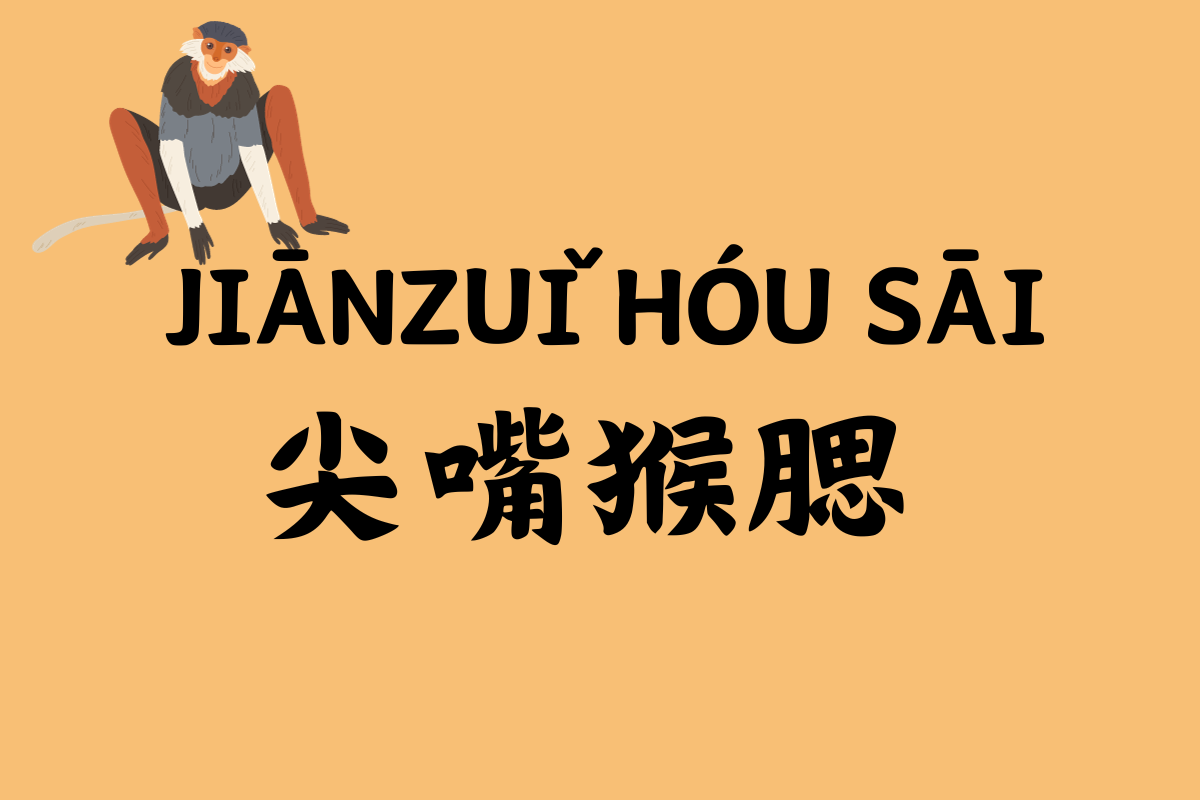Sharp-Beaked Monkey Cheeks-尖嘴猴腮 (jiān zuǐ hóu sāi)
"尖嘴猴腮" (jiān zuǐ hóu sāi) is a Chinese idiom that originates from a classic Chinese tale. In an ancient village nestled in the mountains, a cheeky monkey lived alongside the villagers. This monkey had a sharp mouth and 脸颊 (liǎn jiá) cheeks, as the idiom suggests.
One day, the villagers decided to teach the monkey a lesson about speaking rudely. They presented the monkey with a basket of delicious, ripe peaches, a fruit he adored. But there was a catch: each time he attempted to take a peach, he received a pinch on the cheeks, leading to great discomfort and pain.
The monkey soon realized that his sharp mouth and cheeks were causing him pain whenever he tried to satisfy his desires. Over time, he learned to speak more kindly and considerately. The idiom "尖嘴猴腮" (jiān zuǐ hóu sāi) serves as a reminder that harsh words can hurt not only others but also ourselves.

脸颊 (liǎn jiá), noun, cheek
Examples:
- She pinched her cheek to check if she was awake.
她捏了一下脸颊以确认自己是否醒来。
Tā niēle yīxià liǎnjiá yǐ quèrèn zìjǐ shìfǒu xǐng lái. - A tear rolled down his cheek when he heard the touching story.
听到那感人的故事时,一滴眼泪沿着他的脸颊滚落下来。
Tīng dào nà gǎnrén de gùshì shí, yī dī yǎnlèi yánzhe tā de liǎnjiá gǔn luò xiàlái.
The Inspiration (启发 - Qǐfā)
The story of "尖嘴猴腮" (jiān zuǐ hóu sāi) offers an important lesson about the impact of our words on others and ourselves. In today's world, where communication is key, it reminds us to choose our words carefully and 说 (shuō) speak with kindness and empathy.
说 (shuō), verb, speak
Examples:
- She can speak multiple languages fluently.
她能流利地说多种语言。
Tā néng liúlì de shuō duōzhǒng yǔyán. - He didn't want to speak about the incident.
他不想说那件事情。
Tā bù xiǎng shuō nà jiàn shìqíng.
Modern Application (现代如何运用 - Xiàndài Rúhé Yùnyòng)
The idiom "尖嘴猴腮" holds a timeless message in our contemporary world. In an age of digital communication and social media, where words travel faster than ever, it is crucial to be mindful of the impact our words can have on both ourselves and others.
Key Sentences:
- Her sharp tongue hurt her friends, so she learned not to be a "Monkey with Sharp Mouth and Cheeks."
她尖嘴伤友,于是学着不当"尖嘴猴腮"。
Tā jiānzuǐ shāng yǒu, yúshì xuézhe bù dāng "Jiānzuǐ Hóu Sāi." - He used to be a "JMonkey with Sharp Mouth and Cheeks" but changed, now he speaks kindly.
他曾是"尖嘴猴腮"但改变了,现在说话和善。
Tā céng shì "Jiānzuǐ Hóu Sāi" dàn gǎibiànle, xiànzài shuōhuà hé shàn. - By avoiding "Monkey with Sharp Mouth and Cheeks" behavior, they maintain harmony in the workplace.
避免"尖嘴猴腮"的行为,他们在工作中保持和谐。
Bìmiǎn "Jiānzuǐ Hóu Sāi" de xíngwéi, tāmen zài gōngzuò zhōng bǎochí héxié.